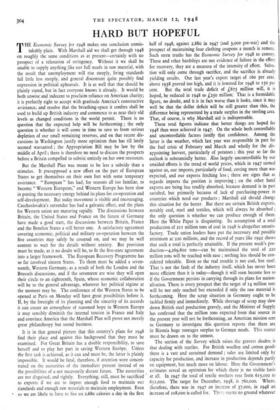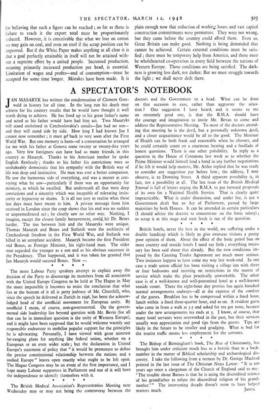HARD BUT HOPEFUL
THE Economic Survey for 1948 makes one conclusion unmis- takably plain. With Marshall aid we shall get through 1948 on roughly the same conditions as at present—certainly with no prospect of a relaxation of stringency. Without it we shall be unable to supply anything like our full needs in raw material, with the result that unemployment will rise steeply, living standards fall little less steeply, and general discontent quite possibly find expression in political upheavals. It is as well that that should be plainly stated, but in fact everyone knows it already. It would be both unwise and indecent to proclaim reliance on American charity; it is perfectly right to accept with gratitude America's constructive assistance, and resolve that the breathing-space it confers shall be used to build up British industry and commerce to as near their old levels as changed conditions in the world permit. There is no question that the expected help will be forthcoming ; the only question is whether it will come in time to save us from serious depletion of our small remaining reserves, and on that recent dis- cussions in Washington justify more optimism than has till lately seemed warranted ; the Appropriation Bill may be law by the middle of April ; there is therefore no need to discuss the prospects before a Britain compelled to subsist entirely on her own resources.
But the Marshall Plan was meant to be less a subsidy than a stimulus. It presupposed a new effort on the part of European States to get themselves on their own feet with some temporary assistance. " European " has had, for reasons all too familiar, to become " Western European," and Western Europe has been slow in putting the necessary energy behind its plans for co-operation and self-development. But today movement is visible and encouraging. Czechoslovakia's surrender has had a galvanic effect, and the plans for Western union are maturing rapidly. The discussions between Britain, the United States and France on the future of Germany have made a good start, the discussions between Britain, France and the Benelux States a still better one. A satisfactory agreement covering economic, political and military co-operation between the five countries may safely be counted on, and we may be well content to wait for the details without anxiety. But provision must be made, as it no doubt will be, to fit the five-state agreement into a larger 'framework. The European Recovery Programme has so far involved sixteen States. To them must be added a seven- teenth, Western Germany, as a result of both the London and the Brussels discussions, and if the seventeen are wise they will open their circle to an eighteenth, Spain, whose economic collaboration will be to the general advantage, whatever her political regime at the moment may be. The conference of the Western States to be opened at Paris on Monday will have great possibilities before it. If, by the foresight of its planning and the sincerity of its accords it can create an atmosphere of reasoned hope in Western Europe it may sensibly diminish the internal tension in France and Italy and convince America that the Marshall Plan will prove not merely great philanthropy but sound business.
It is in that general picture that this country's plans for 1948 find their place and against this background that they must be examined. For Great Britain has a double responsibility, to save herself and to play her part in saving Western Europe. Unless the first task is achieved, as it can and must be, the latter is plainly impossible. It would be fatal, therefore, if attention were concen- trated on the austerities of the immediate present instead of on the possibilities of a not necessarily distant future. The austerities are not disguised, and rightly. Everything, still, must be sacrificed to exports if we are to import enough food to maintain our standards and enough raw materials to maintain employment. Even so we are likely to have to live on 2480 calories a day in the first half of 1948, against 2,88o in 1947 (and 3,000 pre-war) and the prospect of maintaining four clothing coupons a month is remote. Such stern truths has the Economic Survey for 1948 to convey. These and other hardships are not evidence of failure in the effort for recovery, they are a measure of the intensity of effort. Salva- tion will only come through sacrifice, and the sacrifice is already yielding results. Our last year's export target of 16o per cent. above 1938 proved too high, and it is lowered for 1948 to 150 per cent. But the total trade deficit of £675 million will, it is hoped, be reduced in 1948 to £250 million: That is a formidable figure, no doubt, and it is in fact worse than it looks, since it may well be that the dollar deficit will be still greater than this, the difference being represented by a trade surplus in the sterling area. That, of course, is why Marshall aid is indispensable.
These total figures indicate that better things are hoped for x948 than were achieved in 1947. On the whole both controllable and uncontrollable factors justify that confidence. Among the latter is the weather, which last year was responsible in part for the fuel crisis of February and March and wholly for the dis- appointing harvest, particularly of potatoes ; this year so far the outlook is substantially better. Also largely uncontrollable by our unaided efforts is the trend of world prices, which in 1947 turned against us, our imports, particularly of food, costing more than was expected, and our exports fetching less ; there are signs that as regards imports the position is improving ; on the other hand exports are being less readily absorbed, because demand is in part satisfied, but primarily because of lack of purchasing-power in countries which need our products ; Marshall aid should change this situation for the better. .But there are certain British exports, notably coal, steel and textiles, which will always be absorbed ; the only question is whether we can produce enough of them. Here the White Paper is disquieting. Its assumption of a total production of 211 million tons of coal in 1948 is altogether unsatis- factory. Trade union leaders have put the necessary and possible minimum at-220 millions, and the record of years like 1942 shows that such a total is perfectly attainable. If the present week's pro- duction-4,269,800 tons—can be maintained the total of 220 million tons will be reached with ease ; nothing less should be con- sidered tolerable. Even so the real trouble is not coal, but steel. That is not the fault of the industry itself, which has never been more efficient than it is today—though it will soon become less so if the Government persists in carrying through its plans for nation- alisation. There is every prospect that the target of 14 million tons will be not only reached but exceeded if only the raw material is forthcoming. Here the scrap situation in Germany ought to be tackled firmly and immediately. While shortage of scrap may slow down British steel production gravely, and the Minister of Supply has confessed that the million tons expected from that source in the present year will not be forthcoming, an American mission sent to Germany to investigate this question reports that there are in Bizonia huge tonnages surplus to German needs. This source must be drawn on to the utmost.
The section of the Survey which raises the gravest doubts is that dealing with textiles. For British woollen and cotton goods there is a vast and sustained demand ; sales are limited only by capacity for production, and increase in production depends partly on equipment, but much more on labour. Here the Government's estimates reveal an optimism for which there is no visible basis at all. In .1947 the total of textile workers rose from 615,000 to 652,000. The target for December, 1948, is 760,000. Where, therefore, there was in 1947 an increase of 37,000, in 5948 an increase of 108,000 is called for. Thc-..-..s ccems no ground whatever for believing that such a figure can be reached ; so far as there is failure to reach it the export total must be proportionately reduced. However, it is conceivable that what we lose on cotton we may gain on coal, and even on steel if the scrap position can be improved. But if the White Paper makes anything at all clear it is that a goal perfectly attainable in itself will not be attained with- out a supreme effort by a united people. 'Increased production, meaning primarily increased production per head, is essential. Limitation of wages and profits—and of consumption—must be accepted for some time longer. Mistakes have been made. It is plain enough now that reduction of workirz hours and vast capital construction commitments were premature. They were not wrong, but they came before the country could afford them. Even so, Great Britain can make good. Nothing is being demanded that cannot be achieved. Certain external conditions must be satis- fied ; there must be temporary help from America, and there must be wholehearted co-operation in every field between the nations of Western Europe. Those conditions are being satisfied. The dark- ness is growing less dark, not darker. But we must struggle towards the light ; we shall never drift there.



































 Previous page
Previous page